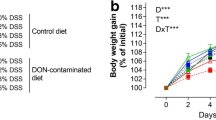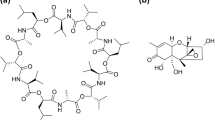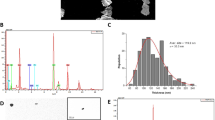Abstract
The mycotoxin deoxynivalenol (DON) is a frequent contaminant of cereals and their by-products in areas with a moderate climate. Produced by Fusarium species, it is one of the most prevalent mycotoxins in cereal crops worldwide, and the most frequently occurring type B trichothecene in Europe. Due to its toxic properties, high stability and prevalence, the presence of DON in the food chain could represent a major public health risk. However, despite its well-known acute toxicological effects, information on the adverse effects of realistic exposure remains limited. We orally exposed mice during 9 months to DON at doses relevant for currently estimated human intake and explored the impact on various gut health parameters. DON exposure induced recruitment of regulatory B cells, and activation of regulatory T cells and dendritic cells in mesenteric lymph nodes. Several inflammatory parameters were increased in colon of DON-exposed mice, whereas inversely inflammatory markers were decreased in ileum. Histomorphological impairments were observed from the duodenum to the colon. Both colon and jejunum presented a hyperproliferation of epithelial cells and an increased expression of mature absorptive cells markers. Finally, DON exposure reshaped gut microbial structure and drastically disturbed the abundance of several bacterial phyla, families, and genera, leading to dysbiosis. Chronic oral exposure to human relevant doses of DON induces several disturbances of gut homeostasis with likely pathological implications for susceptible individuals.






Similar content being viewed by others
References
Akbari P, Braber S, Gremmels H et al (2014) Deoxynivalenol: a trigger for intestinal integrity breakdown. FASEB J 28:2414–2429. https://doi.org/10.1096/fj.13-238717
Alizadeh A, Braber S, Akbari P et al (2015) Deoxynivalenol impairs weight gain and affects markers of gut health after low-dose, short-term exposure of growing pigs. Toxins 7:2071–2095. https://doi.org/10.3390/toxins7062071
Berry D, Schwab C, Milinovich G et al (2012) Phylotype-level 16S rRNA analysis reveals new bacterial indicators of health state in acute murine colitis. ISME J 6:2091–2106. https://doi.org/10.1038/ismej.2012.39
Bonder MJ, Tigchelaar EF, Cai X et al (2016) The influence of a short-term gluten-free diet on the human gut microbiome. Genome Med 8:45. https://doi.org/10.1186/s13073-016-0295-y
Bretz M, Beyer M, Cramer B et al (2006) Thermal degradation of the Fusarium mycotoxin deoxynivalenol. J Agric Food Chem 54:6445–6451. https://doi.org/10.1021/jf061008g
Caporaso JG, Kuczynski J, Stombaugh J et al (2010) QIIME allows analysis of high-throughput community sequencing data. Nat Methods 7:335–336. https://doi.org/10.1038/nmeth.f.303
Chen W, Liu F, Ling Z et al (2012) Human intestinal lumen and mucosa-associated microbiota in patients with colorectal cancer. PloS One 7:e39743. https://doi.org/10.1371/journal.pone.0039743
Chumpitazi BP, Hollister EB, Oezguen N et al (2014) Gut microbiota influences low fermentable substrate diet efficacy in children with irritable bowel syndrome. Gut Microbes 5:165–175. https://doi.org/10.4161/gmic.27923
Collado MC, Calabuig M, Sanz Y (2007) Differences between the fecal microbiota of coeliac infants and healthy controls. Curr Issues Intest Microbiol 8:9
EFSA Panel on Contaminants in the Food Chain (CONTAM), Knutsen HK, Alexander J et al (2017) Risks to human and animal health related to the presence of deoxynivalenol and its acetylated and modified forms in food and feed. EFSA J. https://doi.org/10.2903/j.efsa.2017.4718
European Food Safety Authority (2013) Deoxynivalenol in food and feed: occurrence and exposure. EFSA J. https://doi.org/10.2903/j.efsa.2013.3379
Grignard E, Guéguen Y, Grison S et al (2008) In vivo effects of chronic contamination with 137 cesium on testicular and adrenal steroidogenesis. Arch Toxicol 82:583–589
Gueguen Y, Rouas C, Monin A et al (2014) Molecular, cellular, and tissue impact of depleted uranium on xenobiotic-metabolizing enzymes. Arch Toxicol 88:227–239
Hansen R, Russell RK, Reiff C et al (2012) Microbiota of de-novo pediatric IBD: increased Faecalibacterium prausnitzii and reduced bacterial diversity in Crohn’s but not in ulcerative colitis. Am J Gastroenterol 107:1913–1922. https://doi.org/10.1038/ajg.2012.335
Herlemann DP, Labrenz M, Jürgens K et al (2011) Transitions in bacterial communities along the 2000 km salinity gradient of the Baltic sea. ISME J 5:1571–1579. https://doi.org/10.1038/ismej.2011.41
Houston SA, Cerovic V, Thomson C et al (2016) The lymph nodes draining the small intestine and colon are anatomically separate and immunologically distinct. Mucosal Immunol 9:468. https://doi.org/10.1038/mi.2015.77
Kawabe T, Suzuki N, Yamaki S et al (2016) Mesenteric lymph nodes contribute to proinflammatory Th17-cell generation during inflammation of the small intestine in mice. Eur J Immunol 46:1119–1131. https://doi.org/10.1002/eji.201545907
Litvak Y, Byndloss MX, Tsolis RM, Bäumler AJ (2017) Dysbiotic Proteobacteria expansion: a microbial signature of epithelial dysfunction. Curr Opin Microbiol 39:1–6. https://doi.org/10.1016/j.mib.2017.07.003
Livak KJ, Schmittgen TD (2001) Analysis of relative gene expression data using real-time quantitative PCR and the 2−∆∆CT method. methods 25:402–408. https://doi.org/10.1006/meth.2001.1262
Maharshak N, Packey CD, Ellermann M et al (2013) Altered enteric microbiota ecology in interleukin 10-deficient mice during development and progression of intestinal inflammation. Gut Microbes 4:316–324. https://doi.org/10.4161/gmic.25486
Mahnke K, Johnson TS, Ring S, Enk AH (2007) Tolerogenic dendritic cells and regulatory T cells: a two-way relationship. J Dermatol Sci 46:159–167. https://doi.org/10.1016/j.jdermsci.2007.03.002
Maresca M (2013) From the gut to the brain: journey and pathophysiological effects of the food-associated trichothecene mycotoxin deoxynivalenol. Toxins 5:784–820. https://doi.org/10.3390/toxins5040784
Maukonen J, Kolho K-L, Paasela M et al (2015) Altered fecal microbiota in paediatric inflammatory bowel disease. J Crohns Colitis 9:1088–1095. https://doi.org/10.1093/ecco-jcc/jjv147
Mavin E, Nicholson L, Ahmed SR et al (2017) Human regulatory T cells mediate transcriptional modulation of dendritic cell function. J Immunol 198:138–146. https://doi.org/10.4049/jimmunol.1502487
McDonald D, Price MN, Goodrich J et al (2012) An improved Greengenes taxonomy with explicit ranks for ecological and evolutionary analyses of bacteria and archaea. ISME J 6:610–618. https://doi.org/10.1038/ismej.2011.139
Ménard S, Guzylack-Piriou L, Lencina C et al (2014) Perinatal exposure to a low dose of bisphenol A impaired systemic cellular immune response and predisposes young rats to intestinal parasitic infection. PLOS One 9:e112752. https://doi.org/10.1371/journal.pone.0112752
Mohan M, Chow C-ET, Ryan CN et al (2016) Dietary gluten-induced gut dysbiosis is accompanied by selective upregulation of microRNAs with intestinal tight junction and bacteria-binding motifs in rhesus macaque model of celiac disease. Nutrients 8:684. https://doi.org/10.3390/nu8110684
Oswald IP, Marin DE, Bouhet S et al (2005) Immunotoxicological risk of mycotoxins for domestic animals. Food Addit Contam 22:354–360. https://doi.org/10.1080/02652030500058320
Parks DH, Tyson GW, Hugenholtz P, Beiko RG (2014) STAMP: statistical analysis of taxonomic and functional profiles. Bioinform Oxf Engl 30:3123–3124. https://doi.org/10.1093/bioinformatics/btu494
Pieters MN, Freijer J, Baars B-J et al (2002) Risk assessment of deoxynivalenol in food: concentration limits, exposure and effects. Adv Exp Med Biol 504:235–248
Przybylska-Gornowicz B, Tarasiuk M, Lewczuk B et al (2015) The effects of low doses of two fusarium toxins, zearalenone and deoxynivalenol, on the pig jejunum. A light and electron microscopic study. Toxins 7:4684–4705. https://doi.org/10.3390/toxins7114684
Rauch I, Hainzl E, Rosebrock F et al (2014) Type I interferons have opposing effects during the emergence and recovery phases of colitis. Eur J Immunol 44:2749–2760. https://doi.org/10.1002/eji.201344401
Rizzatti G, Lopetuso LR, Gibiino G et al (2017) Proteobacteria: a common factor in human diseases. BioMed Res Int. https://doi.org/10.1155/2017/9351507
Rodrigues I, Naehrer K (2012) A three-year survey on the worldwide occurrence of mycotoxins in feedstuffs and feed. Toxins 4:663–675. https://doi.org/10.3390/toxins4090663
Round JL, Lee SM, Li J et al (2011) The toll-like receptor 2 pathway establishes colonization by a commensal of the human microbiota. Science 332:974–977. https://doi.org/10.1126/science.1206095
Sattler S, Ling G-S, Xu D et al (2014) IL-10-producing regulatory B cells induced by IL-33 (BregIL-33) effectively attenuate mucosal inflammatory responses in the gut. J Autoimmun 50:107–122. https://doi.org/10.1016/j.jaut.2014.01.032
Scott CL, Aumeunier AM, Mowat AM (2011) Intestinal CD103+ dendritic cells: master regulators of tolerance? Trends Immunol 32:412–419. https://doi.org/10.1016/j.it.2011.06.003
Selvanantham T, Lin Q, Guo CX et al (2016) NKT cell-deficient mice harbor an altered microbiota that fuels intestinal inflammation during chemically induced colitis. J Immunol 197:4464–4472. https://doi.org/10.4049/jimmunol.1601410
Shaw KA, Bertha M, Hofmekler T et al (2016) Dysbiosis, inflammation, and response to treatment: a longitudinal study of pediatric subjects with newly diagnosed inflammatory bowel disease. Genome Med 8:75. https://doi.org/10.1186/s13073-016-0331-y
Simet SM, Sisson JH, Pavlik JA et al (2010) Long-term cigarette smoke exposure in a mouse model of ciliated epithelial cell function. Am J Respir Cell Mol Biol 43:635–640
Sundheim L, Lillegaard IT, F\a este CK et al (2017) Deoxynivalenol exposure in Norway, risk assessments for different human age groups. Toxins 9:46. https://doi.org/10.3390/toxins9020046
Taranu I, Marina DE, Burlacu R et al (2010) Comparative aspects of in vitro proliferation of human and porcine lymphocytes exposed to mycotoxins. Arch Anim Nutr 64:383–393. https://doi.org/10.1080/1745039X.2010.492140
Tardivel C, Airault C, Djelloul M et al (2015) The food born mycotoxin deoxynivalenol induces low-grade inflammation in mice in the absence of observed-adverse effects. Toxicol Lett 232:601–611. https://doi.org/10.1016/j.toxlet.2014.12.017
Turner PC, Burley VJ, Rothwell JA et al (2008) Deoxynivalenol: rationale for development and application of a urinary biomarker. Food Addit Contam Part Chem Anal Control Expo Risk Assess 25:864–871. https://doi.org/10.1080/02652030801895040
Wang X, Wang J, Rao B, Deng L (2017) Gut flora profiling and fecal metabolite composition of colorectal cancer patients and healthy individuals. Exp Ther Med 13:2848–2854. https://doi.org/10.3892/etm.2017.4367
Wold LE, Ying Z, Hutchinson KR et al (2012) Cardiovascular remodeling in response to long-term exposure to fine particulate matter air pollution clinical perspective. Circ Heart Fail 5:452–461
Wu L, Liao P, He L et al (2015) Dietary l-arginine supplementation protects weanling pigs from deoxynivalenol-induced toxicity. Toxins 7:1341–1354. https://doi.org/10.3390/toxins7041341
Yamamoto M, Matsumoto S (2016) Gut microbiota and colorectal cancer. Genes Environ 38:11. https://doi.org/10.1186/s41021-016-0038-8
Yan Y, Kolachala V, Dalmasso G et al (2009) Temporal and spatial analysis of clinical and molecular parameters in dextran sodium sulfate induced colitis. PloS One 4:e6073
Yang Y, Chen G, Yang Q et al (2017) Gut microbiota drives the attenuation of dextran sulphate sodium-induced colitis by Huangqin decoction. Oncotarget 8:48863. https://doi.org/10.18632/oncotarget.16458
Zackular JP, Baxter NT, Iverson KD et al (2013) The gut microbiome modulates colon tumorigenesis. mBio 4:e00692–13. https://doi.org/10.1128/mBio.00692-13
Zeng MY, Inohara N, Nunez G (2017) Mechanisms of inflammation-driven bacterial dysbiosis in the gut. Mucosal Immunol 10:18–26. https://doi.org/10.1038/mi.2016.75
Zhang J, Kobert K, Flouri T, Stamatakis A (2014) PEAR: a fast and accurate Illumina paired-end reAd mergeR. Bioinf Oxf Engl 30:614–620. https://doi.org/10.1093/bioinformatics/btt593
Zhou Y, Zhi F (2016) Lower level of bacteroides in the gut microbiota is associated with inflammatory bowel disease: a meta-analysis. BioMed Res Int 2016:5828959. https://doi.org/10.1155/2016/5828959
Zhu J, Xu Y, Zhu C et al (2017) IL-33 induces both regulatory B cells and regulatory T cells in dextran sulfate sodium-induced colitis. Int Immunopharmacol 46:38–47. https://doi.org/10.1016/j.intimp.2017.02.006
Acknowledgements
We thank the animal facility of Lille University Hospital for the animal care.
Funding
This work was supported by grants from the FHU Imminent and Digestscience (European Research Foundation on Intestinal Diseases and Nutrition).
Author information
Authors and Affiliations
Corresponding author
Ethics declarations
Ethical approval
All applicable international, national, and/or institutional guidelines for the care and use of animals were followed. All procedures performed in studies involving animals were in accordance with the ethical standards of the institution or practice at which the studies were conducted.
Research involving human participants and/or animals
This article does not contain any studies with human participants performed by any of the authors.
Electronic supplementary material
Below is the link to the electronic supplementary material.
Rights and permissions
About this article
Cite this article
Vignal, C., Djouina, M., Pichavant, M. et al. Chronic ingestion of deoxynivalenol at human dietary levels impairs intestinal homeostasis and gut microbiota in mice. Arch Toxicol 92, 2327–2338 (2018). https://doi.org/10.1007/s00204-018-2228-6
Received:
Accepted:
Published:
Issue Date:
DOI: https://doi.org/10.1007/s00204-018-2228-6




